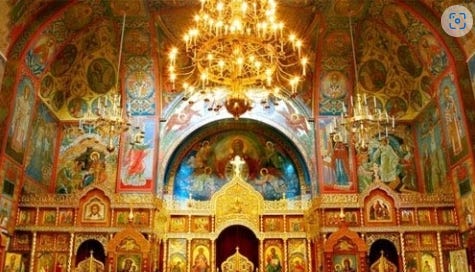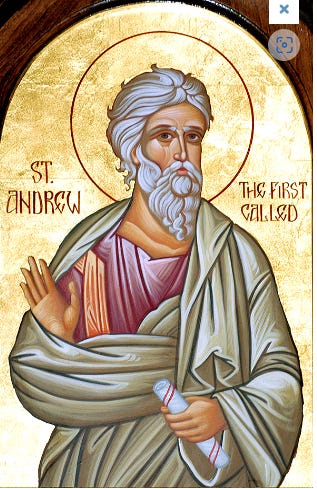A man went into the forest to choose a tree from which to make roof-beams. And he saw two trees, one beside the other. One was smooth and tall, but had rotted away inside, and the other was rough on the outside and ugly, but its core was healthy. The man sighed, and said to himself: “What use is this tree to me if it is rotten inside and useless for beams? The other it is rough and ugly, is at least healthy on the inside and so, if I put a bit more effort into it, I can use it for roof-beams for my house.” And, without thinking any more about it, he chose that tree.
So will God choose between two men for His house, and will choose not the one who appears outwardly righteous, but the one whose heart is filled with God’s healthy righteousness.
+ St. Nikolai Velimirovich, “Sunday of the Pharisee and the Publican: The Gospel on True and False Prayer” Homilies Volume 1: Commentary on the Gospel Readings for Great Feasts and Sundays Throughout the Year
Daily Scripture Readings
1 Corinthians 4:9-16 (Epistle, Apostle)
9 For I think that God has displayed us, the apostles, last, as men condemned to death; for we have been made a spectacle to the world, both to angels and to men.
10 We are fools for Christ’s sake, but you are wise in Christ! We are weak, but you are strong! You are distinguished, but we are dishonored!
11 To the present hour we both hunger and thirst, and we are poorly clothed, and beaten, and homeless.
12 And we labor, working with our own hands. Being reviled, we bless; being persecuted, we endure;
13 being defamed, we entreat. We have been made as the filth of the world, the offscouring of all things until now.
14 I do not write these things to shame you, but as my beloved children I warn you.
15 For though you might have ten thousand instructors in Christ, yet you do not have many fathers; for in Christ Jesus I have begotten you through the gospel.
16 Therefore I urge you, imitate me.
John 1:35-51 (Gospel, Apostle)
35 Again, the next day, John stood with two of his disciples.
36 And looking at Jesus as He walked, he said, “Behold the Lamb of God!”
37 The two disciples heard him speak, and they followed Jesus.
38 Then Jesus turned, and seeing them following, said to them, “What do you seek?” They said to Him, “Rabbi,” (which is to say, when translated, Teacher) “where are You staying?”
39 He said to them, “Come and see.” They came and saw where He was staying, and remained with Him that day (now it was about the tenth hour).
40 One of the two who heard John speak, and followed Him, was Andrew, Simon Peter’s brother.
41 He first found his own brother Simon, and said to him, “We have found the Messiah” (which is translated, the Christ).
42 And he brought him to Jesus. Now when Jesus looked at him, He said, “You are Simon the son of Jonah. You shall be called Cephas” (which is translated, A Stone).
43 The following day Jesus wanted to go to Galilee, and He found Philip and said to him, “Follow Me.”
44 Now Philip was from Bethsaida, the city of Andrew and Peter.
45 Philip found Nathanael and said to him, “We have found Him of whom Moses in the law, and also the prophets, wrote – Jesus of Nazareth, the son of Joseph.”
46 And Nathanael said to him, “Can anything good come out of Nazareth?” Philip said to him, “Come and see.”
47 Jesus saw Nathanael coming toward Him, and said of him, “Behold, an Israelite indeed, in whom is no deceit!”
48 Nathanael said to Him, “How do You know me?” Jesus answered and said to him, “Before Philip called you, when you were under the fig tree, I saw you.”
49 Nathanael answered and said to Him, “Rabbi, You are the Son of God! You are the King of Israel!”
50 Jesus answered and said to him, “Because I said to you, ‘I saw you under the fig tree,’ do you believe? You will see greater things than these.”
51 And He said to him, “Most assuredly, I say to you, hereafter you shall see heaven open, and the angels of God ascending and descending upon the Son of Man.”
Holy and All-praised Apostle Andrew the First-called
The Holy Apostle Andrew the First-Called was the first of the Apostles to follow Christ, and he later brought his own brother, the holy Apostle Peter, to Christ (John 1:35-42). The future apostle was from Bethsaida, and from his youth he turned with all his soul to God. He did not enter into marriage, and he worked with his brother as a fisherman. When the holy Prophet, Forerunner and Baptist John began to preach, Saint Andrew became his closest disciple. Declaring Christ to be the Lamb of God, Saint John the Baptist himself sent to Christ his own two disciples, the future Apostles Andrew and John the Theologian.
After the Descent of the Holy Spirit upon the Apostles, Saint Andrew went to the Eastern lands preaching the Word of God. He went through Asia Minor, Thrace, Macedonia, he reached the River Danube, went along the coast of the Black Sea, through Crimea, the Black Sea region and along the River Dniepr he climbed to the place where the city of Kiev now stands.
After the Descent of the Holy Spirit upon the Apostles, Saint Andrew went to the Eastern lands preaching the Word of God. He went through Asia Minor, Thrace, Macedonia, he reached the River Danube, went along the coast of the Black Sea, through Crimea, the Black Sea region and along the River Dniepr he climbed to the place where the city of Kiev now stands.
He stopped overnight on the hills of Kiev. Rising in the morning, he said to those disciples that were with him: “See these hills? Upon these hills shall shine forth the beneficence of God, and there will be a great city here, and God shall raise up many churches.” The apostle went up around the hills, blessed them and set up a cross. Having prayed, he went up even further along the Dniepr and reached a settlement of the Slavs, where Novgorod was built. From here the apostle went through the land of the Varangians towards Rome for preaching, and again he returned to Thrace, where in the small village of Byzantium, the future Constantinople, he founded the Church of Christ. The name of the holy Apostle Andrew links the mother, the Church of Constantinople, with her daughter, the Russian Church.
On Secular Churches and the Mystical Sacrifice
A headline caught my eye several days ago: “They Tried to Start a Church Without God. For a While, It Worked.” While the concept of a church without God is beyond doubt bizarre, it nevertheless also makes perfect sense. In our age of loneliness, amidst the near-total collapse of practically every traditional form of community and social structure, to abandon Christianity is to hurtle oneself into the void foretold by Nietzsche when he proclaimed the “murder” of God:
What were we doing when we unchained this earth from its sun? Whither is it moving now? Whither are we moving? Away from all suns? Are we not plunging continually? Backward, sideward, forward, in all directions? Is there still any up or down? Are we not straying, as through an infinite nothing? Do we not feel the breath of empty space? Has it not become colder? Is not night continually closing in on us?
Living in cities, we become strangers. We visit our friends by sitting alone and staring at screens. Moving from job to job and from place to place, we remain rootless — only half-committed to our own lives. When my parents moved into a new subdivision outside Raleigh, North Carolina in 1999, they purchased the last new house on the street. In less than two decades, every single family on that street had moved away besides them. More and more, our lives have absolutely nothing to do with the people right around us. Half of all American children will even experience the shattering of their own home through divorce before the day they turn eighteen.
In a world such as this, churches are among the last remaining havens of love and community — although even this bastion against isolation has been largely eroded in American life due to the phenomenon known as “church-shopping,” in which Christianity becomes cafeteria-style: merely another consumer commodity. So it is no surprise when the article tells us that Justina Walford, upon apostatizing and moving to New York City, “had never felt more alone.”
It is interesting to note that Justina grew up in a non-religious family, and converted to Christianity on her own as a child. She was apparently quite zealous, and even wanted to be a pastor herself. It is even more interesting to note the reason she lost her faith: it was “a casualty of overseas travel that made her question how any one religious community could have a monopoly on truth.”
This week’s calendar reminders:
Monday 11/25: Matins 8:30 a.m.
Tuesday 11/26: no services or events
Wednesday 11/27: no services or events
Thursday 11/28: Thanksgiving Day Liturgy 8:30 a.m.
Friday 11/29: Paraklesis to Theotokos 8:30 a.m.
Saturday 11/30: Catechumen class 4:30pm; Great Vespers 6pm
Sunday 12/1: Divine Liturgy 9: 15 a.m.











